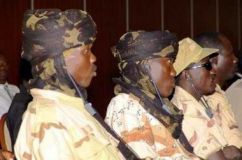Many doubt Darfur peace talk success
Nov 25, 2005 (KHARTOUM) — Months of talks to end the conflict in Darfur have been stymied by rebel divisions and escalating violence, leading many to be publicly pessimistic before the next round scheduled to open on Monday even begin.
 Six rounds of African Union-sponsored talks to end the fighting, which has killed tens of thousands and created one of the world’s worst humanitarian disasters, have so far decided only on a declaration of principles from all sides.
Six rounds of African Union-sponsored talks to end the fighting, which has killed tens of thousands and created one of the world’s worst humanitarian disasters, have so far decided only on a declaration of principles from all sides.
But the negotiations have made little headway on the meaty issues of wealth and power sharing at the heart of the conflict.
Mobina Jaffer, Canada’s special envoy for peace in Sudan who has worked in the country for four years, said: “For the first time I’m pessimistic about Sudan.”
Critics blame all sides for the diplomatic stalemate that continues to cost lives on the ground.
Two leaders now claim the presidency of the main rebel group, the Sudan Liberation Army (SLA), after elections held in a congress in Darfur earlier this month ousted the incumbent and installed a new leader in a move not recognized by all factions.
High-level U.S., U.N. and AU efforts at mediation have failed until now to broker a compromise position between the two men, Minni Arcua Minnawi and Abdel Wahed Mohamed el-Nur.
Leading Sudanese politician Mubarak al-Fadil al-Mahdi said the government team from Khartoum, led by powerful presidential advisor Majzoub al-Khalifa, did not have a transparent plan going into the talks.
He dismissed the discussions as pointless in any case because he said the government could not be trusted to make good on a deal if one were reached.
“There’s no point having these talks in Abuja,” he said. “This government is not even honoring agreements they’ve already signed.”
Mahdi was referring to the laborious and slow process of implementing a peace deal signed in January which ended a separate, bloodier conflict in Sudan’s south.
A NEW MECHANISM?
The peace talks were due to begin on November 21, but the AU delayed them to leave time for last-minute mediation between the SLA leaders. Now the talks are scheduled to resume on Monday but it is not guaranteed that they will.
As Darfur rebel groups fracture on the ground and Arab militia, not represented at the talks, step up attacks on rebels and civilians, many feel the process has been decapitated and any agreement in Abuja will make little difference in Darfur.
The second rebel group at Abuja, the smaller Justice and Equality Movement (JEM), has split with its field commanders at least twice. Aid workers in Darfur complain they are being attacked by renegade SLA commanders who seem to ignore ceasefire agreements signed by the leaders representing them at talks.
“Definitely the players in Abuja are not sufficiently representative of all of Darfur,” said Dave Mozersky of the International Crisis Group.
“There does need to be another mechanism to bring in the other voices.”
Mostly non-Arab rebels took up arms in early 2003 accusing the central government of monopolizing wealth and power. The United Nations says Khartoum responded by arming Arab militias, who launched a campaign of widespread looting, rape and killing.
The United States called the violence genocide.
Khartoum denies the charge but the International Criminal Court is investigating alleged war crimes in the region, where more than 2 million people have fled their homes for miserable camps inside Darfur and into neighboring Chad.
Mozersky also said the government’s delegation to Abuja talks should form a new position to reflect Sudan’s government of national unity, formed in September, and include the former southern rebels, the Sudan People’s Liberation Army (SPLA).
The SPLA have historically good relations with the Darfur rebels and analysts say their presence in the delegation would help increase trust between the negotiating sides.
Three SPLA members say they will be going to the talks, but no new position has been adopted.
“I think the initial signs do not look very good,” Mozersky said.
(Reuters)
